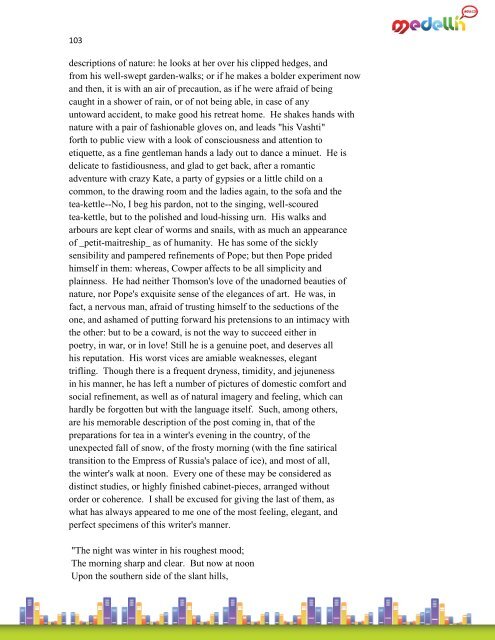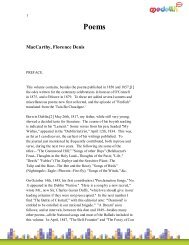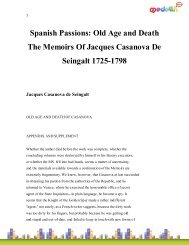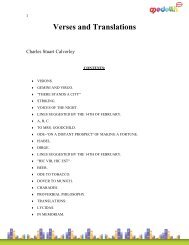Lectures On The English Poets William Hazlitt
Lectures On The English Poets William Hazlitt
Lectures On The English Poets William Hazlitt
Create successful ePaper yourself
Turn your PDF publications into a flip-book with our unique Google optimized e-Paper software.
103<br />
descriptions of nature: he looks at her over his clipped hedges, and<br />
from his well-swept garden-walks; or if he makes a bolder experiment now<br />
and then, it is with an air of precaution, as if he were afraid of being<br />
caught in a shower of rain, or of not being able, in case of any<br />
untoward accident, to make good his retreat home. He shakes hands with<br />
nature with a pair of fashionable gloves on, and leads "his Vashti"<br />
forth to public view with a look of consciousness and attention to<br />
etiquette, as a fine gentleman hands a lady out to dance a minuet. He is<br />
delicate to fastidiousness, and glad to get back, after a romantic<br />
adventure with crazy Kate, a party of gypsies or a little child on a<br />
common, to the drawing room and the ladies again, to the sofa and the<br />
tea-kettle--No, I beg his pardon, not to the singing, well-scoured<br />
tea-kettle, but to the polished and loud-hissing urn. His walks and<br />
arbours are kept clear of worms and snails, with as much an appearance<br />
of _petit-maitreship_ as of humanity. He has some of the sickly<br />
sensibility and pampered refinements of Pope; but then Pope prided<br />
himself in them: whereas, Cowper affects to be all simplicity and<br />
plainness. He had neither Thomson's love of the unadorned beauties of<br />
nature, nor Pope's exquisite sense of the elegances of art. He was, in<br />
fact, a nervous man, afraid of trusting himself to the seductions of the<br />
one, and ashamed of putting forward his pretensions to an intimacy with<br />
the other: but to be a coward, is not the way to succeed either in<br />
poetry, in war, or in love! Still he is a genuine poet, and deserves all<br />
his reputation. His worst vices are amiable weaknesses, elegant<br />
trifling. Though there is a frequent dryness, timidity, and jejuneness<br />
in his manner, he has left a number of pictures of domestic comfort and<br />
social refinement, as well as of natural imagery and feeling, which can<br />
hardly be forgotten but with the language itself. Such, among others,<br />
are his memorable description of the post coming in, that of the<br />
preparations for tea in a winter's evening in the country, of the<br />
unexpected fall of snow, of the frosty morning (with the fine satirical<br />
transition to the Empress of Russia's palace of ice), and most of all,<br />
the winter's walk at noon. Every one of these may be considered as<br />
distinct studies, or highly finished cabinet-pieces, arranged without<br />
order or coherence. I shall be excused for giving the last of them, as<br />
what has always appeared to me one of the most feeling, elegant, and<br />
perfect specimens of this writer's manner.<br />
"<strong>The</strong> night was winter in his roughest mood;<br />
<strong>The</strong> morning sharp and clear. But now at noon<br />
Upon the southern side of the slant hills,

















